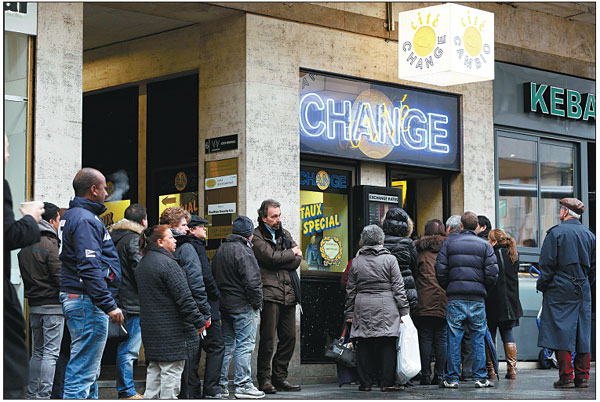Euro back in crisis mode as Davos awaits ECB guidance
Draghi attempts to craft cross-border consensus needed for full-blown QE
It's a familiar place for the currency bloc, which spent the past five years struggling for growth, the faith of investors and even its very existence.
The latest concerns, that failure to break political logjams dumps the region back into recession and crisis, are propelling the continent back up the worry list of investors, executives and policy makers heading to the World Economic Forum's annual meeting in Davos.
A Greek election in six days may hand a slice of power to a party gunning to renegotiate the austerity on which the nation's bailout is based, potentially serving as a preview for votes in Portugal and Spain and reviving talk of a euro exit.
At the same time, European Central Bank President Mario Draghi, the man who defused the turmoil in 2012, is trying to craft the cross-border consensus needed for full-blown quantitative easing as the threat of deflation hovers over the region and governments resist overtures to do more.
"The politics of Europe is so much more problematic even though the economics look better," says Ian Bremmer, founder and president of the New York-based Eurasia Group. "Everywhere you look politically, bottom up, inside out, outside in, Europe is bad this year."
False dawn
That's a reversal of fortune from last year when Draghi was telling Davos delegates that he anticipated signs of a "dramatic" improvement in his economy's health, and German Finance Minister Wolfgang Schaeuble declared the crisis over.
For a sign of the renewed concern, look no further than the euro, which turned 16 years of age this month and is trading at its lowest in more than a decade against the dollar.
The currency's downward slide was compounded by the Swiss National Bank's surprise decision on Thursday to scrap its currency cap on the franc, sparking turmoil in markets. The euro fell more than 3 percent last week, the biggest weekly drop in more than two years.
The first of this year's election battles will be in Greece, the euro-zone's original problem child.
Voting takes place on Jan 25 with Syriza leading in opinion polls after five years of fiscal austerity and with unemployment still north of 25 percent. The party is pledging to ease the budget squeeze on which international aid depends and seek a writedown on some of the country's debt.
That would put it on a collision course with the so-called troika of creditors including the ECB, which has kept the country afloat with 240 billion euros ($277 billion) of loans pledged since 2010.
Collision course
While Syriza leader Alexis Tsipras has committed to keeping Greece in the euro area, the ECB has warned the country could lose financial support if its rescue program collapses. Some in Germany have also expressed a belief that a departure of Greece would now be manageable, although Chancellor Angela Merkel wants it to remain.
There are some reasons for confidence that there won't be spillover in financial markets if Greece does bail. Aid programs are now in place to defend stressed markets and state finances across the bloc are in better shape, with bond yields declining to records in Italy and Spain even amid Grexit speculation.
Signaling comfort with a smaller currency bloc may still be a bluff nobody wants to call for fear investors would then turn their sights on the likes of Portugal, Ireland, Spain and perhaps even Italy.
|
Customers queue up outside a currency exchange office in Geneva, on Friday. Swiss stocks sank on Friday, extending the sell-off sparked by the Swiss National Bank's surprise decision to remove a ceiling on the Swiss franc that sent the currency soaring. Pierre Albouy / Reuters |



















